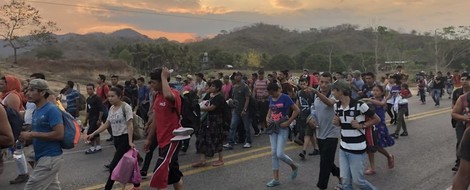Your podcast discovery platform
Curious minds select the most fascinating podcasts from around the world. Discover hand-piqd audio recommendations on your favorite topics.

piqer for: Globalization and politics Global finds
Luis BARRUETO is a journalist from Guatemala. Studied business and finance journalism at Aarhus University in Denmark and City University London.
To Migrants From Central America, Mexico Is A "Vertical Border"
To Central American migrants who coined the term, Mexican territory has become a sort of vertical wall for those on their way to the United States.
Before they reach the US-Mexico border, migrants have to overcome many types of violence, especially at the hands of the Mexican police and military. In addition, they face dangers and vulnerabilities by virtue of the US and Mexico's joint management of migration in ways that privilege national security – even at the expense of people's security and safety.
This piq refers to a blog post written in a rather dry and technical language. But I thought it important to share nonrtheless, as the idea of a vertical wall is a powerful one to explain other news pieces, related to the plight of Central American migrants in transit to the US.
Their routes vary, but danger arises from two main sources:
First is the security-centered discourse that drives migration policy, aligned with the fight against human trafficking and illegal migration. This approach is centered in "hunting" migrants and preventing their arrival to the US Border, effectively empowering Mexican authorities to detain people while they are in transit. This effectively pushes migrants into more clandestine routes and territories, leaving them vulnerable to organized crime and drug cartels.
The war on drugs, meanwhile, has led to cruder fights for control of the territory, leaving thousands of migrants caught in the crossfire. More than 20,000 migrants are kidnapped every year as a result, and a number ranging between 72,000 and 120,000 are missing in total. Thousands of corpses have been found in mass and clandestine graves.
Yet as thousands of migrants in transit decide to continue on their journey, they form "community, family, and survivor networks" for mutual support and aid.
"Despite fleeing violence and hardship", Amarela Varela concludes, "Central American migrants are met by another war that is being waged against them."
